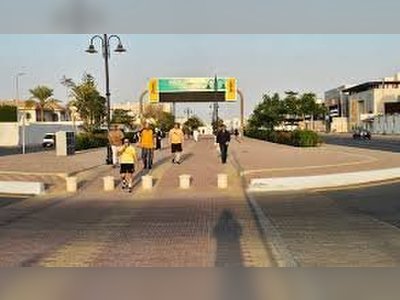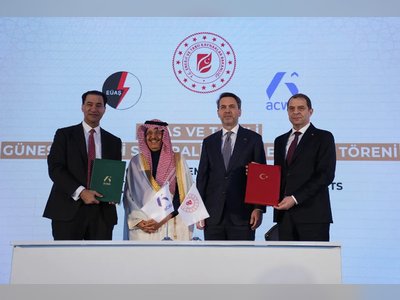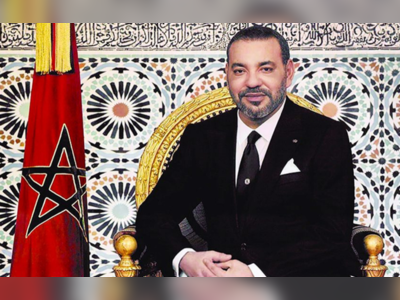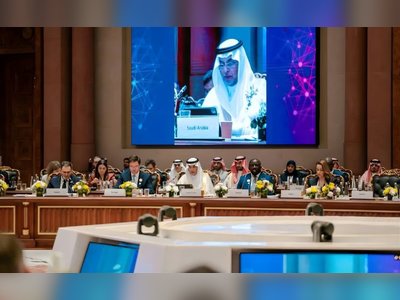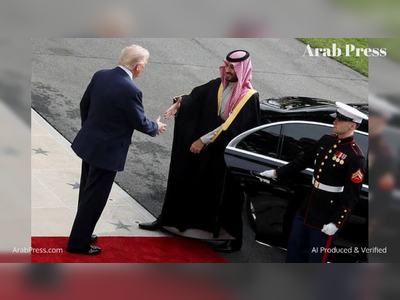
KAUST... Saudi incubator for international expertise in AI research and innovations
King Abdullah University of Science and Technology (KAUST) tends to include artificial intelligence in all fields, given the importance of this technology, which is top among the revolutionary technologies in the world, and its future role in affecting the lifestyle in general.
KAUST has sought to be an effective academic institution by increasing human capabilities and expanding interdisciplinary research and innovations locally and regionally supported by an advanced infrastructure equipped with advanced technologies under the umbrella of the University’s Artificial Intelligence Initiative and its Director Professor Jürgen Schmidhuber.
In that context, the university’s Assistant Professor of Computer Science Dr. Mohammed Al-Husseini has developed an advanced algorithm that simulates human creativity through the learning technology without images, and the ability to deduce and convert words into images in cooperation with Dr. Mohammed Al-Feki, from the University of Central Florida, this algorithm paves the way for “artificial imagination” and automated classification of new plant and animal species.
Al-Husseini and El-Feki's research aims to develop a so-called "image-free learning algorithm" (ZSL) to help identify previously unseen objects, according to category-level descriptions without training examples.
The researchers designed a visual learning process model for the “unseen before” categories by linking the learning algorithm without pictures to human creativity, taking into account that the algorithm is based on recognizing things that have not been seen before, while creativity is related to creating “a likable thing that has not been seen before.”
In another research, KAUST used artificial intelligence to reveal the secrets of mysterious stone monuments in Saudi Arabia, where the huge and mysterious stone structures known as "rectangles" in the northwest of the Kingdom are among the oldest monuments in the world, dating back 7000 years, but they have not been sufficiently studied.
In this context, a research team from the university contributed to accelerating the pace of archaeological explorations in the Kingdom, using artificial intelligence techniques.
For more than a decade, archaeologists have manually used available sources of satellite imagery, researching software such as Google Maps; to obtain clues about potential archaeological sites, and then conduct field visits to these sites.
KAUST's research tackled the development of technical creativity for artificial intelligence through a research paper presented by Dr. Mohammed Al-Husseini, which was remarkably accepted at the International Conference on Computational Creativity (ICCC) 2022, which is the first conference on computer creative artificial intelligence.
The field of fine art production was based on artificial intelligence and machine learning techniques through the use of CWAN networks to produce new or original artworks.
This is done by training networks on existing plastic art patterns by exposing them to a large repository of paintings from different schools and artistic styles, from 5000 years ago up until the present time.
The researcher and his team were able to produce more creative artworks compared to other current AI methods — a conclusion supported by empirical findings, including artwork evaluations, in which 341 people participated. The results show that CWANs can produce new artworks much better than other latest methods.
On the role of artificial intelligence in supporting sustainability, the Assistant Professor of Chemical Engineering at the Center for Advanced Membranes and Porous Materials at KAUST Dr. Gyorgy Szekely is conducting research in sustainable manufacturing based on proven statistics that the chemical-based industry wastes more than 50 percent of the energy to make its products, whether it's a commodity chemical, a mobile phone polymer, or a micro-pharmaceutical compound.
Szekely’s research is focused on developing a technology that can reduce energy consumption by 90 percent by replacing thermochemical separations with selective porous membrane technology — to simply filter the desired product at ambient temperature — thus achieving a dramatic increase in efficiency.
“Membrane separations consume a fraction of the energy compared to conventional separation techniques,” said Szekely.
Professor Szekely continues to focus on the industry's problems, and some of his membrane separation solutions are now in commercial use, but it is a slow process that takes months of experimentation in the lab and may involve increased resource consumption and waste generation costs.
The Szekely group has recently created an open database that can be accessed by anyone online and can be used for resolving problems of membrane separation with nanofiltration technology in organic solvents.
“The computer predicted that the membrane would retain 100 percent of patchoulol, and when we tested this membrane we found that it separated 100 percent of patchoulol, so the AI was very accurate 100 percent in a real-world problem,” said Sekele.
Based on this finding, Professor Szekely at KAUST has a compelling computational tool to advance his research in sustainable manufacturing.
In that context, the university’s Assistant Professor of Computer Science Dr. Mohammed Al-Husseini has developed an advanced algorithm that simulates human creativity through the learning technology without images, and the ability to deduce and convert words into images in cooperation with Dr. Mohammed Al-Feki, from the University of Central Florida, this algorithm paves the way for “artificial imagination” and automated classification of new plant and animal species.
Al-Husseini and El-Feki's research aims to develop a so-called "image-free learning algorithm" (ZSL) to help identify previously unseen objects, according to category-level descriptions without training examples.
The researchers designed a visual learning process model for the “unseen before” categories by linking the learning algorithm without pictures to human creativity, taking into account that the algorithm is based on recognizing things that have not been seen before, while creativity is related to creating “a likable thing that has not been seen before.”
In another research, KAUST used artificial intelligence to reveal the secrets of mysterious stone monuments in Saudi Arabia, where the huge and mysterious stone structures known as "rectangles" in the northwest of the Kingdom are among the oldest monuments in the world, dating back 7000 years, but they have not been sufficiently studied.
In this context, a research team from the university contributed to accelerating the pace of archaeological explorations in the Kingdom, using artificial intelligence techniques.
For more than a decade, archaeologists have manually used available sources of satellite imagery, researching software such as Google Maps; to obtain clues about potential archaeological sites, and then conduct field visits to these sites.
KAUST's research tackled the development of technical creativity for artificial intelligence through a research paper presented by Dr. Mohammed Al-Husseini, which was remarkably accepted at the International Conference on Computational Creativity (ICCC) 2022, which is the first conference on computer creative artificial intelligence.
The field of fine art production was based on artificial intelligence and machine learning techniques through the use of CWAN networks to produce new or original artworks.
This is done by training networks on existing plastic art patterns by exposing them to a large repository of paintings from different schools and artistic styles, from 5000 years ago up until the present time.
The researcher and his team were able to produce more creative artworks compared to other current AI methods — a conclusion supported by empirical findings, including artwork evaluations, in which 341 people participated. The results show that CWANs can produce new artworks much better than other latest methods.
On the role of artificial intelligence in supporting sustainability, the Assistant Professor of Chemical Engineering at the Center for Advanced Membranes and Porous Materials at KAUST Dr. Gyorgy Szekely is conducting research in sustainable manufacturing based on proven statistics that the chemical-based industry wastes more than 50 percent of the energy to make its products, whether it's a commodity chemical, a mobile phone polymer, or a micro-pharmaceutical compound.
Szekely’s research is focused on developing a technology that can reduce energy consumption by 90 percent by replacing thermochemical separations with selective porous membrane technology — to simply filter the desired product at ambient temperature — thus achieving a dramatic increase in efficiency.
“Membrane separations consume a fraction of the energy compared to conventional separation techniques,” said Szekely.
Professor Szekely continues to focus on the industry's problems, and some of his membrane separation solutions are now in commercial use, but it is a slow process that takes months of experimentation in the lab and may involve increased resource consumption and waste generation costs.
The Szekely group has recently created an open database that can be accessed by anyone online and can be used for resolving problems of membrane separation with nanofiltration technology in organic solvents.
“The computer predicted that the membrane would retain 100 percent of patchoulol, and when we tested this membrane we found that it separated 100 percent of patchoulol, so the AI was very accurate 100 percent in a real-world problem,” said Sekele.
Based on this finding, Professor Szekely at KAUST has a compelling computational tool to advance his research in sustainable manufacturing.


